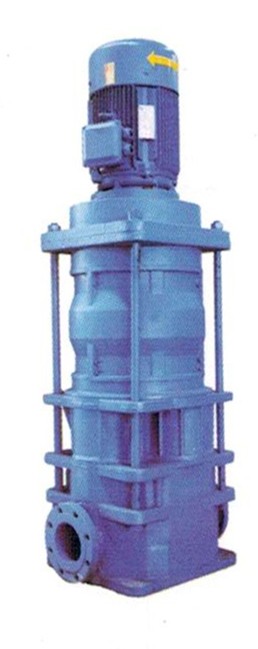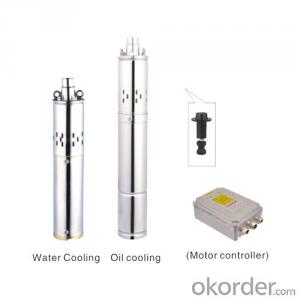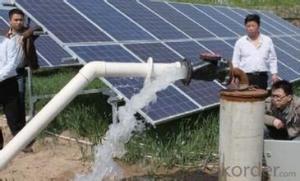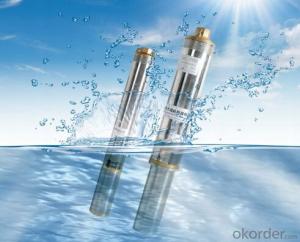Solar Pump Water Well L3D-30-240
- Loading Port:
- China Main Port
- Payment Terms:
- TT OR LC
- Min Order Qty:
- -
- Supply Capability:
- 300 sets unit/month
OKorder Service Pledge
OKorder Financial Service
You Might Also Like
Product description:
Product: Solar water pump
Model:L3D-30-240
Appilication:
surface pump
for surface water of pond, river, lake
for irrigation of a big farm with 20000 m2 on the top of a mountain
Product specification:
flow rate:30m3/ hour, 210m3/day.
lift: 10m-240m
pump diameter: 610mm
Pump installed on the ground, outlet to the water surface:4m
with AC motor, motor power:22kW
but only need solar power:22kW(while Grundfos pump needs at least 45kW solar power, our pump can save more than 50% solar panel power,save USD15000 cost for solar panel per set.
Material:
Pump inside: stainless steel and wearable nylon,it enables our solar pump to have 10 years sevice life.
Motor : AC motor, 380V , three phase , 50Hz. The pump also can connect with grid power directly.
Certification:
3 International patent
ISO9001
CE
Warranty:2 years
- Q: Can a solar pump be used in combination with a drip irrigation system?
- Yes, a solar pump can be used in combination with a drip irrigation system. In fact, using a solar pump can be a cost-effective and energy-efficient solution for powering a drip irrigation system. Solar pumps rely on photovoltaic panels to convert sunlight into electricity, which can then be used to power the pump. This eliminates the need for grid electricity or fuel-based generators, making it a sustainable and environmentally friendly option. Drip irrigation systems are designed to deliver water directly to the roots of plants in a slow and controlled manner, minimizing water wastage and evaporation. By combining a solar pump with a drip irrigation system, farmers and gardeners can ensure that their crops receive the right amount of water, at the right time, while reducing water consumption and optimizing plant growth. Solar pumps can be configured to match the specific water requirements of a drip irrigation system, allowing for precise control over water flow and delivery. They can also be equipped with sensors and controllers to automate the irrigation process, further improving efficiency and reducing manual labor. Furthermore, using a solar pump for drip irrigation can be particularly beneficial in areas with limited or unreliable access to electricity. The sun is a free and abundant source of energy, making solar pumps a viable solution for remote or off-grid locations. In summary, a solar pump can certainly be used in combination with a drip irrigation system, providing a sustainable, cost-effective, and efficient solution for watering crops and plants.
- Q: Can a solar pump be used for water supply in oil refineries or petrochemical plants?
- Yes, a solar pump can be used for water supply in oil refineries or petrochemical plants. Solar pumps are a sustainable and efficient solution for water supply in various industrial applications, including those in the oil and petrochemical industry. They can help reduce energy costs and dependence on traditional power sources, making them a viable option for water supply in these facilities.
- Q: Is a solar pump suitable for all types of water sources?
- No, a solar pump may not be suitable for all types of water sources. Factors such as the depth and quality of the water source, as well as the specific requirements of the pump system, need to be considered to determine if a solar pump is suitable.
- Q: How does a solar pump help in maintaining water quality?
- A solar pump helps in maintaining water quality by promoting continuous water circulation, preventing stagnation and the growth of harmful bacteria and algae. It also reduces the need for manual pumping, which can introduce contaminants into the water. Additionally, solar pumps are often used in conjunction with filtration systems, ensuring that the water is clean and safe for various purposes such as drinking, irrigation, or livestock watering.
- Q: What kind of warranty is offered for a solar pump?
- The kind of warranty offered for a solar pump varies depending on the manufacturer and model. Generally, solar pumps come with a warranty that covers manufacturing defects, performance issues, and any necessary repairs or replacements. It is advisable to check the specific warranty terms and conditions provided by the manufacturer before making a purchase.
- Q: Can solar pumps be used for both residential and commercial purposes?
- Yes, solar pumps can be used for both residential and commercial purposes. They are an efficient and cost-effective solution for water pumping needs in various settings, including homes, farms, gardens, and commercial establishments. Solar pumps are versatile and can be customized to meet the specific requirements of each application. They provide a sustainable and environmentally friendly alternative to traditional pumps, reducing energy costs and dependence on fossil fuels.
- Q: How does the energy usage of a solar pump system vary with different pumping depths?
- The energy usage of a solar pump system generally increases with deeper pumping depths. As the depth increases, the pump needs to work against higher water pressure, resulting in increased energy requirements. However, it is also important to consider the efficiency of the pump system, as more efficient pumps can minimize the energy consumption even at greater depths.
- Q: How does a solar pump handle water source contamination from radioactive materials?
- A solar pump does not directly address the issue of water source contamination from radioactive materials. It is primarily designed to harness solar energy to pump water, but it does not have specific mechanisms to filter or treat water contaminated with radioactive materials. In such cases, additional water treatment systems or methods would be required to ensure the removal or reduction of radioactive contaminants before the water can be considered safe for use.
- Q: How does the programming and control system of a solar pump work?
- The programming and control system of a solar pump works by utilizing various components and technologies to ensure efficient and reliable operation. Firstly, the system consists of solar panels that convert sunlight into electrical energy. These panels are usually installed in a location with maximum exposure to sunlight to ensure optimal energy generation. The solar panels are connected to a charge controller, which regulates the voltage and current from the panels to prevent overcharging of the batteries. The control system also includes batteries, which store the generated electrical energy for later use when sunlight is not available, such as during the night or on cloudy days. The batteries are connected to an inverter, which converts the stored DC (direct current) power into AC (alternating current) power, suitable for driving the pump motor. The programming aspect of the system involves setting up timers and sensors to control the pump's operation. For instance, a timer can be programmed to activate the pump during specific times of the day when sunlight is abundant. This ensures that the pump operates when there is sufficient solar energy available. In addition, sensors can be integrated into the system to monitor water levels, pressure, or other relevant parameters. These sensors can provide feedback to the control system, allowing it to adjust the pump's speed or halt operation if certain thresholds are exceeded. This helps in preventing over-pumping or damage to the system. Furthermore, the programming and control system may also incorporate features such as remote monitoring and control. This allows users to monitor the pump's performance, receive alerts on any issues, and adjust settings remotely using a smartphone or computer. Such features enhance convenience and enable proactive maintenance. Overall, the programming and control system of a solar pump combines the power generation capabilities of solar panels, the energy storage capacity of batteries, and intelligent programming to optimize the pump's operation. This results in an efficient, sustainable, and reliable water pumping solution that harnesses the power of the sun.
- Q: Are solar pumps environmentally friendly?
- Yes, solar pumps are environmentally friendly. They use clean and renewable energy from the sun to power the pumps, eliminating the need for fossil fuels. This reduces greenhouse gas emissions and air pollution. Additionally, solar pumps have minimal environmental impact as they do not require the extraction of natural resources and have lower maintenance and operational costs compared to traditional pumps.
Send your message to us
Solar Pump Water Well L3D-30-240
- Loading Port:
- China Main Port
- Payment Terms:
- TT OR LC
- Min Order Qty:
- -
- Supply Capability:
- 300 sets unit/month
OKorder Service Pledge
OKorder Financial Service
Similar products
Hot products
Hot Searches
Related keywords



















